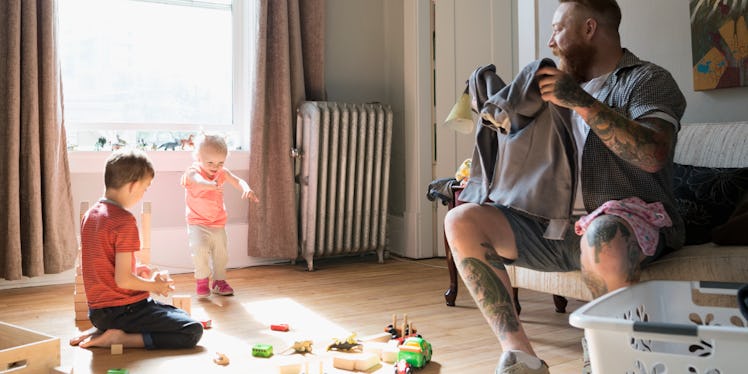5 Surprising Benefits of Fathers Doing Laundry
Aside from not being filthy. But you didn't need research to tell you that.

The following was produced in partnership with the Environmental Protection Agency’s ENERGY STAR® program. Clothes washers and dryers that have earned the ENERGY STAR make laundry better — for your clothes, for you, for your family, and for the environment.
One of the major shifts in modern parenthood is fathers spending more time with their kids at home. Now that they’re home, data shows that they’re doing more housework. In a 2011 survey, 41 percent of millennial fathers said they’re the primary laundry-doer in their household. A more recent Wall Street Journal report and survey by consumer research firm Mintel found that 60 percent of men age 35 to 54 do their own laundry. For men aged 18 to 34, specifically, that number was 67 percent — a 23 percent increase from only three years prior. This is an encouraging trend and not solely because many of the previous non-laundry doers were almost certainly filthy or because sharing chores is only fair. As it turns out, there are real and unexpected benefits to putting energy into your home life.
READ MORE: The Fatherly Guide to Chores
Let’s start with the one that should appeal most to men: that doing housework appeals to women. Research led by Dr. John Gottman at the University of Washington found that wives were more sexually attracted to their mates the more they helped with domestic chores like doing laundry. Whether it was the stress reduction or affirmation of love and caring that did it remained to be determined, though the husbands polled weren’t too concerned with the need for further research. The bottom line: when men do more housework, relationships improve.
That’s good for husbands and wives and it’s also beneficial to their kids. Back in 2003, a nationwide survey of more than 3,500 kids and their parents found that school-aged children who do housework with their fathers were more likely to get along with their peers and have more friends. More than a decade later (that’s a lot of lost socks), another report came to the provocative conclusion that daughters of fathers who do more household chores are more ambitious and less likely to limit their career aspirations to female-dominated fields. In other words, the true way to win friends and influence people just might be to do laundry with dad.
There are also some very fundamental ways doing laundry with kids benefits their development. Sorting and categorizing laundry with toddlers can help them develop those skills, which are essential to developing language. Counting items and measuring detergent also helps bolster early math learning.
And when the kids are all grown up, parents’ years of doing their laundry might give the whole family a bit more quality time together. In a 2016 study out of the University Medical Centre of Rotterdam, women who did housework were deemed likely to live 3 years longer than those who did not, while all that cleaning and washing was good for one more year for the guys.
For what it’s worth, the industry seems to have taken notice. Big laundry companies are launching clothes washers and dryers aimed directly at men. And these products are more technologically advanced, feature-laden, and energy efficient than ever before — those that have earned the ENERGY STAR certification require 25 percent less energy and 45 percent less water than standard models. Which means that in addition to lording technological superiority over the neighbors’ laundry rooms, modern chore-doing dads can enjoy the satisfying feeling of doing some good for their kids tomorrow by protecting the environment (and the color fastness of their favorite shirt) today.
All of that is sure to please those fathers that have caught on to the laundry trend and encourage any holdouts to join in. Because in addition to housework responsibility, they all share one other very important thing with their partners: bills.
This article was originally published on